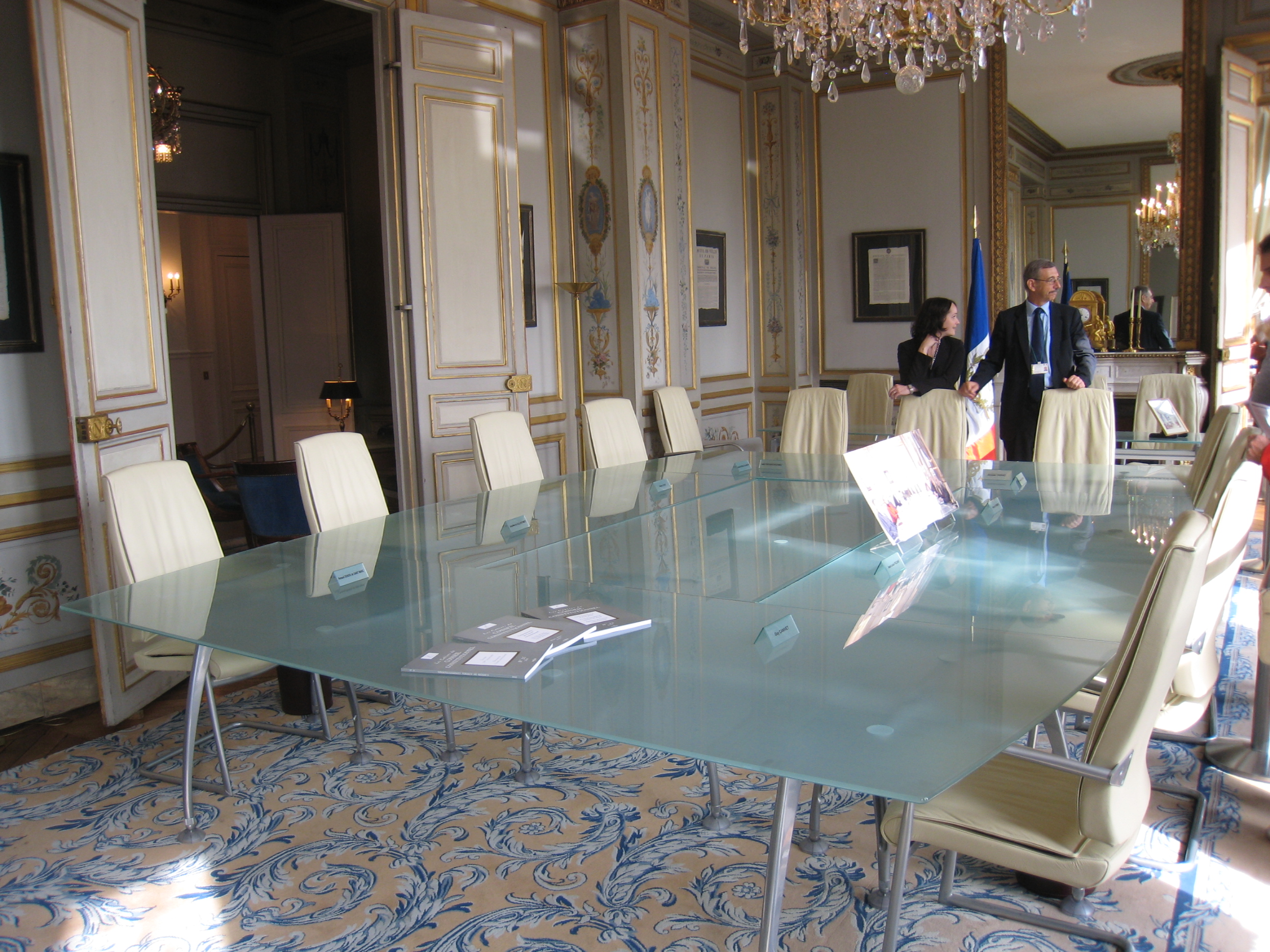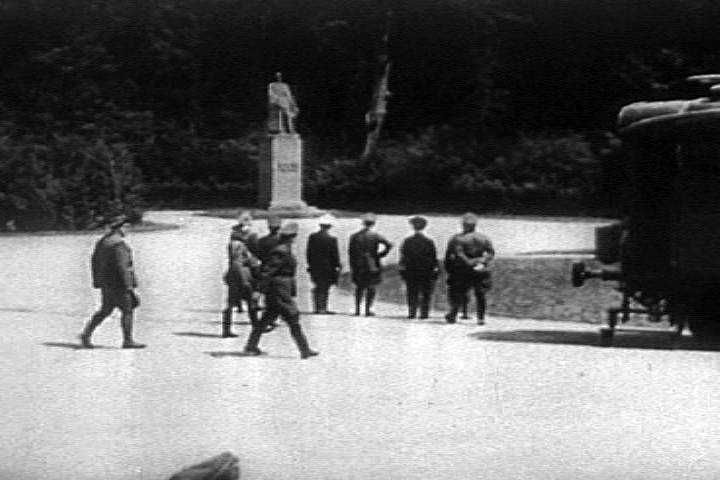|
Léon Noël
Léon Philippe Jules Arthur Noël (28 March 1888 – 6 August 1987) was a French diplomat, politician and historian. Biography He is the son of Jules Noël, ''conseiller d'Etat'', and Cécile Burchard-Bélaváry. He received a Doctor of Laws in 1912 and then became '' Conseiller d'État''. In 1927 he became ''Délégué Général'' of the High Commissioner of the French Republic in Rhineland. He became Prefect of Haut-Rhin in 1930, Plenipotentiary Minister in Prague (1932–1935), and then French Ambassador to Poland (1935–1940). He represented the French Minister of Foreign Affairs in the Second Armistice at Compiègne on 22 June 1940. He was named delegate general in the territories occupied on 9 July 1940. Ten days later he resigned, and he joined de Gaulle in 1943. He is member (1944) next president of French Academy of Moral and Political Sciences (1958). He was a Member of the French Parliament ( RPF) (1951–1955). He was the first President of the Consti ... [...More Info...] [...Related Items...] OR: [Wikipedia] [Google] [Baidu] |
Constitutional Council Of France
The Constitutional Council (, ) is the highest constitutional authority in France. It was established by the Constitution of the Fifth Republic on 4 October 1958 to ensure that constitutional principles and rules are upheld. It is housed in the Palais-Royal in Paris. Its main activity is to rule on whether proposed statutes conform with the Constitution, after they have been voted by Parliament and before they are signed into law by the president of the republic (''a priori'' review), or passed by the government as a decree, which has law status in many domains, a right granted to the government under delegation of Parliament. Since 1 March 2010, individual citizens who are party to a trial or a lawsuit have been able to ask for the council to review whether the law applied in the case is constitutional ( review). In 1971, the council ruled that conformity with the Constitution also entails conformity with two other texts referred to in the preamble of the Constitution, the De ... [...More Info...] [...Related Items...] OR: [Wikipedia] [Google] [Baidu] |
Paris Law Faculty
The Faculty of Law of Paris (), called from the late 1950s to 1970 the Faculty of Law and Economics of Paris, is the second-oldest faculty of law in the world and one of the four and eventually five faculties of the University of Paris ("the Sorbonne"), from the 12th century until 1970. During the Middle Ages, it was one of the two most important faculties of law in the world, along with the faculty of law of the University of Bologna (the oldest in the world). Pierre Abélard, founder of modern law, was its precursor, as a teacher at the cathedral school of Notre-Dame de Paris, Andrea Alciato, founder of legal humanism, was a professor there, and Saint Ivo, patron of lawyers and "Advocate of the Poor" according to the Catholic Church, had studied there. The prohibition by the Pope of teaching of Roman Law limited, however, its growth, to the benefit of the nearby University of Orléans, where numerous important French people studied law. In 1679, King Louis authorized the ... [...More Info...] [...Related Items...] OR: [Wikipedia] [Google] [Baidu] |
Académie Des Sciences Morales Et Politiques
An academy (Attic Greek: Ἀκαδήμεια; Koine Greek Ἀκαδημία) is an institution of tertiary education. The name traces back to Plato's school of philosophy, founded approximately 386 BC at Akademia, a sanctuary of Athena, the goddess of wisdom and Skills, skill, north of Ancient Athens, Athens, Greece. The Royal Spanish Academy defines academy as scientific, literary or artistic society established with public authority and as a teaching establishment, public or private, of a professional, artistic, technical or simply practical nature. Etymology The word comes from the ''Academy'' in ancient Greece, which derives from the Athenian hero, ''Akademos''. Outside the city walls of Athens, the Gymnasium (ancient Greece), gymnasium was made famous by Plato as a center of learning. The sacred space, dedicated to the goddess of wisdom, Athena, had formerly been an olive Grove (nature), grove, hence the expression "the groves of Academe". In these gardens, the philos ... [...More Info...] [...Related Items...] OR: [Wikipedia] [Google] [Baidu] |
Second Armistice At Compiègne
The Armistice of 22 June 1940, sometimes referred to as the Second Armistice at Compiègne, was an agreement signed at 18:36 on 22 June 1940 near Compiègne, France by officials of Nazi Germany and the French Third Republic. It became effective at midnight on 25 June. Signatories for Germany included Wilhelm Keitel, a senior military officer of the Wehrmacht (the German armed forces), while those on the French side held lower ranks, including general Charles Huntziger. Following the decisive German victory in the Battle of France, the armistice established German military administration in occupied France during World War II, a German occupation zone in Northern and Western France that encompassed about three-fifths of Metropolitan France, France's European territory, including all English Channel and Atlantic Ocean ports. The remainder of the country was to be left unoccupied, although Vichy France, the new regime that replaced the Third Republic was mutually recognised as the l ... [...More Info...] [...Related Items...] OR: [Wikipedia] [Google] [Baidu] |
Minister Of Foreign Affairs (France)
The Ministry for Europe and Foreign Affairs (, MEAE) is the ministry of the Government of France that handles France's foreign relations. Since 1855, its headquarters have been located at 37 Quai d'Orsay, close to the National Assembly. The term Quai d'Orsay is often used as a metonym for the ministry. Its cabinet minister, the Minister of Europe and Foreign Affairs () is responsible for the foreign relations of France. The current officeholder, Jean-Noël Barrot, was appointed in September 2024. (For a brief period in the 1980s from 1984 to 1986, the office was titled Minister for External Relations.) In 1547, royal secretaries became specialised, writing correspondence to foreign governments and negotiating peace treaties. The four French secretaries of state where foreign relations were divided by region, in 1589, became centralised with one becoming first secretary responsible for international relations. The Ancien Régime position of Secretary of State for Foreign Aff ... [...More Info...] [...Related Items...] OR: [Wikipedia] [Google] [Baidu] |
Doctor Of Laws
A Doctor of Laws (LL.D.) is a doctoral degree in legal studies. The abbreviation LL.D. stands for ''Legum Doctor'', with the double “L” in the abbreviation referring to the early practice in the University of Cambridge to teach both canon law and civil law (Doctor of both laws). In some jurisdiction it is an honorary degree. Other doctorates in law include Doctor of Juridical Science, Juris Doctor, and Doctor of Philosophy. European and Commonwealth usage In the United Kingdom, Australia, New Zealand, and a number of European countries, the LL.D. is a higher doctorate usually awarded on the basis of exceptionally insightful and distinctive publications that contain significant and original contributions to the study of law. In South Africa, the LL.D. is awarded by many university law faculties as the highest degree in law, also based upon research and completion of a Ph.D. equivalent dissertation as in most European countries; see Doctor of Law in South Africa. The LL.D. ... [...More Info...] [...Related Items...] OR: [Wikipedia] [Google] [Baidu] |
Burchard-Bélaváry Family
The Burchard-Bélaváry family (''Szikavai és Bélaváry Both/Burchard'' in Hungarian ; ''Burchard von Bellawary de Sycava'' in German) is an aristocratic family of Hungarian origin who gave many personalities. Its comes from the ''Both de Bajna'' branch of the Both family, family Magnates of Hungary whose records date back to 1282. Its name was originally Both de Szikava et Bélavár. Members * Johann I Burchart von Bélaváry (1546-1616), who gave a famous dynasty of pharmacists in Tallinn, in Estonia, in the ''Raeapteek'' (from Johann I. to Johann X. ; 1582 – 1911). *György Both de Szikava et Bélavár († 1588), magistrate (''udvarbíró''), governor of fortresses (''várnagy'') including the Devín Castle. * Dávid Bélaváry de Szikava (''ca.'' 1580), diplomat and high official of the Kingdom of Hungary. *Miklós Bélavary, son of Dávid, Grand Treasurer of Upper Hungary (1655), military governor of Upper Hungary (1666). Blood court (1655). *Dávid Belleváry II, g ... [...More Info...] [...Related Items...] OR: [Wikipedia] [Google] [Baidu] |
Councillor Of State (France)
A council of state is a governmental body in a country, or a subdivision of a country, with a function that varies by jurisdiction. It may be the formal name for the Cabinet (government), cabinet or it may refer to a non-executive advisory body associated with a head of state. In some countries it functions as a Administrative court, supreme administrative court and is sometimes regarded as the equivalent of a privy council. Modern * Council of State (Belgium), Belgian Council of State is a judicial and advisory body that assists the executive with obligatory legal advice on each draft law and is the supreme court for administrative justice * State Council of the People's Republic of China, Chinese State Council is the country's highest executive body * Council of State of Colombia, Colombian Council of State * Cuban Council of State * Danish Council of State is similar to a privy council with a largely ceremonial role * Dutch Council of State is an advisory body that consists of ... [...More Info...] [...Related Items...] OR: [Wikipedia] [Google] [Baidu] |
Historian
A historian is a person who studies and writes about the past and is regarded as an authority on it. Historians are concerned with the continuous, methodical narrative and research of past events as relating to the human species; as well as the study of all history in time. Some historians are recognized by publications or training and experience.Herman, A. M. (1998). Occupational outlook handbook: 1998–99 edition. Indianapolis: JIST Works. Page 525. "Historian" became a professional occupation in the late nineteenth century as research universities were emerging in Germany and elsewhere. Objectivity Among historians Ancient historians In the 19th century, scholars used to study ancient Greek and Roman historians to see how generally reliable they were. In recent decades, however, scholars have focused more on the constructions, genres, and meanings that ancient historians sought to convey to their audiences. History is always written with contemporary concerns and ancient hist ... [...More Info...] [...Related Items...] OR: [Wikipedia] [Google] [Baidu] |
Politician
A politician is a person who participates in Public policy, policy-making processes, usually holding an elective position in government. Politicians represent the people, make decisions, and influence the formulation of public policy. The roles or duties that politicians must perform vary depending on the level of government they serve, whether Local government, local, national, or international. The ideological orientation that politicians adopt often stems from their previous experience, education, beliefs, the political parties they belong to, or public opinion. Politicians sometimes face many challenges and mistakes that may affect their credibility and ability to persuade. These mistakes include political corruption resulting from their misuse and exploitation of power to achieve their interests, which requires them to prioritize the public interest and develop long-term strategies. Challenges include how to keep up with the development of social media and confronting biase ... [...More Info...] [...Related Items...] OR: [Wikipedia] [Google] [Baidu] |






